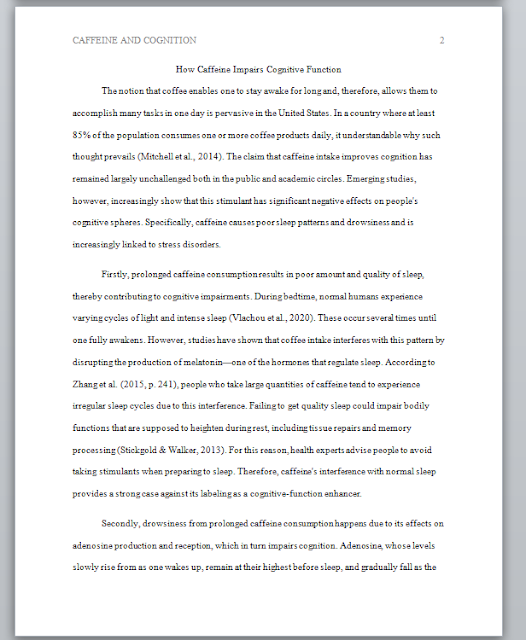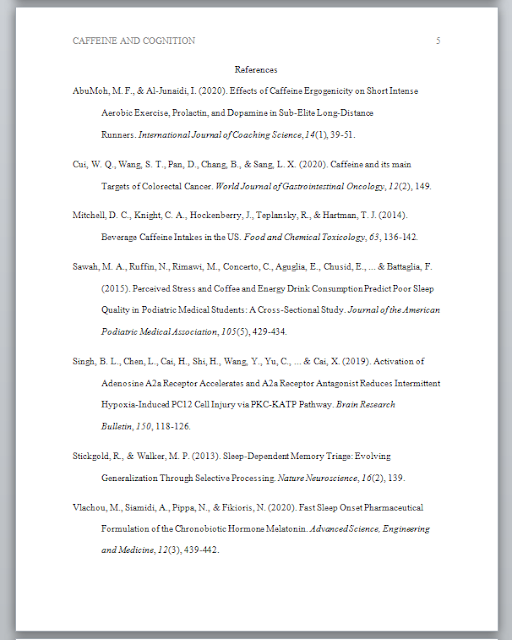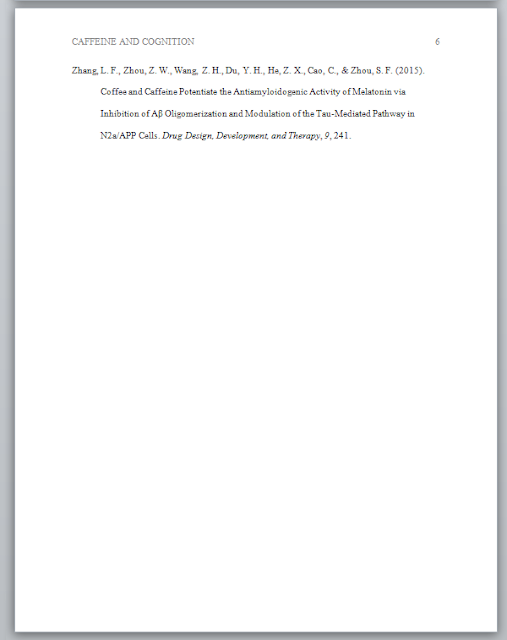Sample Academic Paper
Subject: Psychology
Paper Format: APA
Question: Does caffeine enhance or impair cognitive function?
Need help with your class work? Whatsapp +254726557037
Need help with your class work? Whatsapp +254726557037
Need help with your class work? Whatsapp +254726557037
Content:
How Caffeine
Impairs Cognitive Function
Philip Fulu
Institutional Affiliation
How Caffeine
Impairs Cognitive Function
The
notion that coffee enables one to stay awake for long and, therefore, allows
them to accomplish many tasks in one day is pervasive in the United States. In
a country where at least 85% of the population consumes one or more coffee
products daily, it understandable why such thought prevails (Mitchell et al.,
2014). The claim that caffeine intake improves cognition has remained largely
unchallenged both in the public and academic circles. Emerging studies,
however, increasingly show that this stimulant has significant negative effects
on people's cognitive spheres. Specifically, caffeine causes poor sleep
patterns and drowsiness and is increasingly linked to stress disorders.
Firstly,
prolonged caffeine consumption results in poor amount and quality of sleep,
thereby contributing to cognitive impairments. During bedtime, normal humans
experience varying cycles of light and intense sleep (Vlachou et al., 2020).
These occur several times until one fully awakens. However, studies have shown
that coffee intake interferes with this pattern by disrupting the production of
melatonin—one of the hormones that regulate sleep. According to Zhang et al.
(2015, p. 241), people who take large quantities of caffeine tend to experience
irregular sleep cycles due to this interference. Failing to get quality sleep
could impair bodily functions that are supposed to heighten during rest,
including tissue repairs and memory processing (Stickgold & Walker, 2013).
For this reason, health experts advise people to avoid taking stimulants when
preparing to sleep. Therefore, caffeine's interference with normal sleep
provides a strong case against its labeling as a cognitive-function enhancer.
Secondly,
drowsiness from prolonged caffeine consumption happens due to its effects on
adenosine production and reception, which in turn impairs cognition. Adenosine,
whose levels slowly rise from as one wakes up, remain at their highest before
sleep, and gradually fall as the person sleeps, signals the brain to rest
(Singh et al., 2020, p. 118). While caffeine discourages sleep by reducing the
brain's sensitivity to adenosine, it does not prevent the accumulation of the
hormone, which increases the longer one stays awake (Cui et al., 2020, p. 149).
To remain awake, the individual, therefore, has to consume caffeinated products
after short intervals to counteract the rising adenosine. Moreover, the brain,
having interpreted less adenosine sensitivity to mean shortage, signals for
more production to compensate for the perceived deficiency (Abumoh et al.,
2020, p. 39). This creates a situation in which the body frequently switches
from states of alertness to drowsiness. Moreover, the brain’s sensitivity to
coffee’s stimulation reduces with long-term consumption. On the contrary, the
sensors remain receptive to the high levels of adenosine. This makes one
constantly tired and sleepy (Abumoh et al., 2020, pp. 39 – 51). Under
conditions of exhaustion, it is difficult to concentrate, hence cognition is
impaired.
Another
reason for concern about caffeine intake is the growing body of evidence that
links it to stress disorders. Although inconclusive, a recent study suggests
that consuming coffee-based energy drinks could lead to heightened stress in
young men (Sawah et al., 2015). In an
earlier study, the researchers divided groups of rats that had undergone
stressful experiences into two and then administered caffeine to one division.
Unlike their counterparts, rats that received doses of caffeine had signs of
stress, including loss of appetite, fear, and poor maze navigation (Pattenuzo
et al., 2008). Furthermore, without a previous history of stress, another group
of rats, which also received caffeine doses, presented these discomforts,
thereby suggesting that caffeine has the potential to induce anxiety. Therefore,
although the relationship between coffee intake and stress disorders requires
further examination, these findings should suffice to discourage one from
consuming coffee.
In
conclusion, is difficult to agree with the claim that caffeine enhances
cognition when available evidence indicates otherwise. Not only does coffee
cause sleep disturbance, but it also causes drowsiness in consumers. Besides,
caffeine has been linked to increased stress levels in animals; and there are
signs that caffeine could cause stress issues in humans. Until research in this
area is conclusive, people should minimize or avoid consuming caffeinated
products.
References
AbuMoh, M. F., & Al-Junaidi, I. (2020).
Effects of Caffeine Ergogenicity on Short Intense Aerobic Exercise, Prolactin,
and Dopamine in Sub-Elite Long-Distance Runners. International Journal
of Coaching Science, 14(1), 39-51.
Cui, W. Q., Wang, S. T., Pan, D., Chang, B.,
& Sang, L. X. (2020). Caffeine and its main Targets of Colorectal Cancer. World
Journal of Gastrointestinal Oncology, 12(2), 149.
Mitchell, D. C., Knight, C. A., Hockenberry,
J., Teplansky, R., & Hartman, T. J. (2014). Beverage Caffeine Intakes in
the US. Food and Chemical Toxicology, 63, 136-142.
Sawah, M. A., Ruffin, N., Rimawi, M., Concerto,
C., Aguglia, E., Chusid, E., ... & Battaglia, F. (2015). Perceived Stress
and Coffee and Energy Drink Consumption Predict Poor Sleep Quality in Podiatric
Medical Students: A Cross-Sectional Study. Journal of the American
Podiatric Medical Association, 105(5), 429-434.
Singh, B. L., Chen, L., Cai, H., Shi, H., Wang,
Y., Yu, C., ... & Cai, X. (2019). Activation of Adenosine A2a Receptor Accelerates
and A2a Receptor Antagonist Reduces Intermittent Hypoxia-Induced PC12 Cell
Injury via PKC-KATP Pathway. Brain Research Bulletin, 150,
118-126.
Stickgold, R., & Walker, M. P. (2013).
Sleep-Dependent Memory Triage: Evolving Generalization Through Selective Processing. Nature
Neuroscience, 16(2), 139.
Vlachou, M., Siamidi, A., Pippa, N., &
Fikioris, N. (2020). Fast Sleep Onset Pharmaceutical Formulation of the
Chronobiotic Hormone Melatonin. Advanced Science, Engineering and
Medicine, 12(3), 439-442.
Zhang, L. F., Zhou, Z. W., Wang, Z. H., Du, Y.
H., He, Z. X., Cao, C., & Zhou, S. F. (2015). Coffee and Caffeine
Potentiate the Antiamyloidogenic Activity of Melatonin via Inhibition of Aβ
Oligomerization and Modulation of the Tau-Mediated Pathway in N2a/APP Cells. Drug
Design, Development, and Therapy, 9, 241.
Need help with your class work? Whatsapp +254726557037







